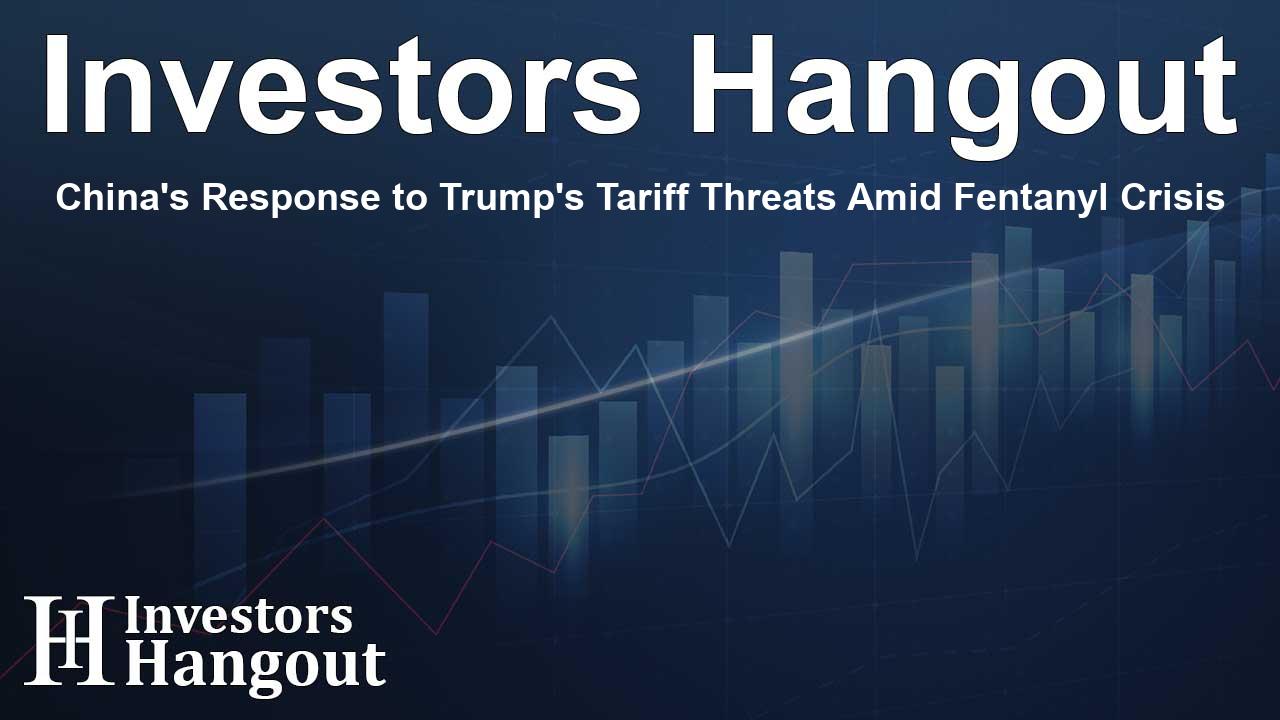China's Response to Trump's Tariff Threats Amid Fentanyl Crisis

Chinese Media Responds to U.S. Tariff Threats
China's state media conveyed a clear message following U.S. President Donald Trump's announcement regarding potential new tariffs on Chinese goods. The reaction was immediate, with major publications in China aiming to address the broader implications of Trump's statements and emphasizing the complexity of international trade relations.
Tariff Implications on U.S.-China Trade Relations
Trump's administration had posited an additional 10% tariff on imports from China, raising considerable concern among Chinese authorities and businesses alike. This proposition comes amid already existing tariff structures which were designed to penalize Chinese imports. The overall implications of these tariffs could significantly affect the economic landscape, given the extensive trade volume that China engages in with the U.S., which surpasses $400 billion annually.
Long-term Economic Concerns
Economic analysts have begun revisiting their forecasts for China’s economic growth. There is an increasing consensus that the tariffs proposed by Trump could hinder economic advancement, influencing growth targets for 2025 and 2026. The growing tension in trade relationships poses a challenge for the $19 trillion economy, leading to cautious outlooks among economists assessing the future.
Fentanyl Crisis as a Central Issue
State media commentaries have strongly focused on Trump’s reasoning for the tariffs, which he attributed to the ongoing fentanyl crisis. Publications such as China Daily highlighted the need for accountability, stating that blaming another nation will not resolve domestic drug issues. This sentiment is reinforced by a broader assertion that the core problems associated with the fentanyl epidemic lie within the U.S. itself, not abroad.
Global Perception of Trade Wars
The response from Chinese media showcases an understanding of the global sentiment regarding trade wars, illustrating that they bring no true winners. A casual reference mentioned that continued politicization of economic issues through tools like tariffs would ultimately harm all parties involved. This perspective aligns with a more cooperative discourse about managing drug-related issues rather than escalating tensions between nations.
Potential Economic Fallout
Trump's administration, however, continues to assert that China is the predominant supplier of fentanyl precursors to Mexican drug cartels. Notably, Trump extended his tariff threats to goods from Mexico and Canada, indicating a broader strategy aimed at tackling drug trafficking. This new phase of tariffs and the potential for escalating trade disputes introduces renewed uncertainty for businesses operating in both economies.
Expert Opinions on Growth Forecasts
Leading economists have expressed concern regarding possible downward revisions in growth forecasts prompted by the potential tariffs. S&P Global recently adjusted its growth predictions for China, citing possible long-term repercussions that could stem from increased tariffs. Notably, the adjustment reflects an understanding that a ripple effect could impact not just traded goods but the economy as a whole.
Conclusion: Navigating Troubling Waters
Overall, it's clear that the landscape of U.S.-China trade relations is shifting, and the ramifications of tariff threats will be felt on multiple levels. The narratives emerging from state media illustrate not only the stakes involved for China's economy but also the urgent need for dialogue aimed at mitigating crises like fentanyl distribution. As the global economy evolves, cooperation may prove essential for both nations moving forward.
Frequently Asked Questions
What triggered the China's media response regarding Trump's tariffs?
The response was triggered by Trump's pledge to impose new tariffs on Chinese imports, which state media interpreted as unjustified, especially considering the context of the fentanyl crisis.
How could Trump's tariffs affect China's economy?
Trump's proposed tariffs may disrupt trade relations, potentially stalling economic growth and leading to adjusted forecasts for the future economic performance of China.
What is the Chinese stance on the fentanyl crisis?
Chinese media argue that the root causes of the fentanyl crisis lie within the U.S. and criticize the framing of tariff threats as a solution to this issue.
Is there a historical context for U.S.-China trade wars?
Historically, trade wars have escalated tensions between nations, often leading to retaliatory actions that disrupt economic stability and contribute to global uncertainty.
What do economic experts say about the future of U.S.-China trade?
Experts suggest that if tariffs continue to rise, both economies could face significant challenges, with potential repercussions for global trade dynamics.
About Investors Hangout
Investors Hangout is a leading online stock forum for financial discussion and learning, offering a wide range of free tools and resources. It draws in traders of all levels, who exchange market knowledge, investigate trading tactics, and keep an eye on industry developments in real time. Featuring financial articles, stock message boards, quotes, charts, company profiles, and live news updates. Through cooperative learning and a wealth of informational resources, it helps users from novices creating their first portfolios to experts honing their techniques. Join Investors Hangout today: https://investorshangout.com/
Disclaimer: The content of this article is solely for general informational purposes only; it does not represent legal, financial, or investment advice. Investors Hangout does not offer financial advice; the author is not a licensed financial advisor. Consult a qualified advisor before making any financial or investment decisions based on this article. The author's interpretation of publicly available data shapes the opinions presented here; as a result, they should not be taken as advice to purchase, sell, or hold any securities mentioned or any other investments. The author does not guarantee the accuracy, completeness, or timeliness of any material, providing it "as is." Information and market conditions may change; past performance is not indicative of future outcomes. If any of the material offered here is inaccurate, please contact us for corrections.